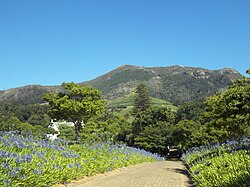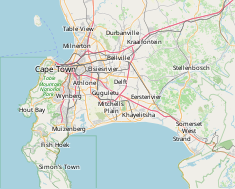Klein Constantia
| Klein Constantia | |
|---|---|

The road leading to the Klein Constantia Manor House, Cellar and Tasting Room
|
|
| Location | Constantia, Cape Town, South Africa. |
| Coordinates | 34°2′20″S 18°24′47.64″E / 34.03889°S 18.4132333°ECoordinates: 34°2′20″S 18°24′47.64″E / 34.03889°S 18.4132333°E |
| Built | 17th century |
| Architectural style(s) | Cape Dutch |
Klein Constantia is a wine estate in the suburb of Constantia in Cape Town, South Africa.
Constantia, the first wine farm in Southern Africa, was established in 1685 by the VOC Governor of the Cape Simon van der Stel, and was used to produce wine as well as other fruit and vegetables and cattle farming. Van der Stel, a keen viticulturist, had been the first to recognize the potential of the decomposed granite soil in the sheltered valley facing False Bay and bounded by sea on both sides after he had had soil samples collected from all over the Cape. He chose this area to plant his vines and named it Constantia.
Following van der Stel's death in 1712 the estate was broken up and sold in three parts (Groot Constantia; Klein Constantia; and Bergvliet).
In 1778 the portion of the estate surrounding van der Stel's mansion was sold to the Cloete family, who planted extensive vineyards of mostly Frontignac, Pontac, red and white Muscadel and a little Steen (Chenin blanc) and extended and improved the mansion. On the death of Hendrik Cloete in 1818, the estate was split, and the upper portion became the property of Cloete's son Johan Gerhard Cloete under the name Klein Constantia.
It was under the Cloete family ownership that Constantia's sweet dessert wine made primarily from vine-dried Muscat de Frontignan grapes reached the height of its fame.Napoleon Bonaparte had as much as 1,126 liters (297 gallons) of Constantia wine shipped in wooden casks each year to Longwood House, his home in exile on St Helena from 1815 until his death in 1821. The Count de las Cases reported that, on his deathbed, Napoleon refused everything offered to him but a glass of Constantia wine.
In Sense and Sensibility, Jane Austen's character Mrs Jennings recommends a little Constantia for "its healing powers on a disappointed heart".
...
Wikipedia

